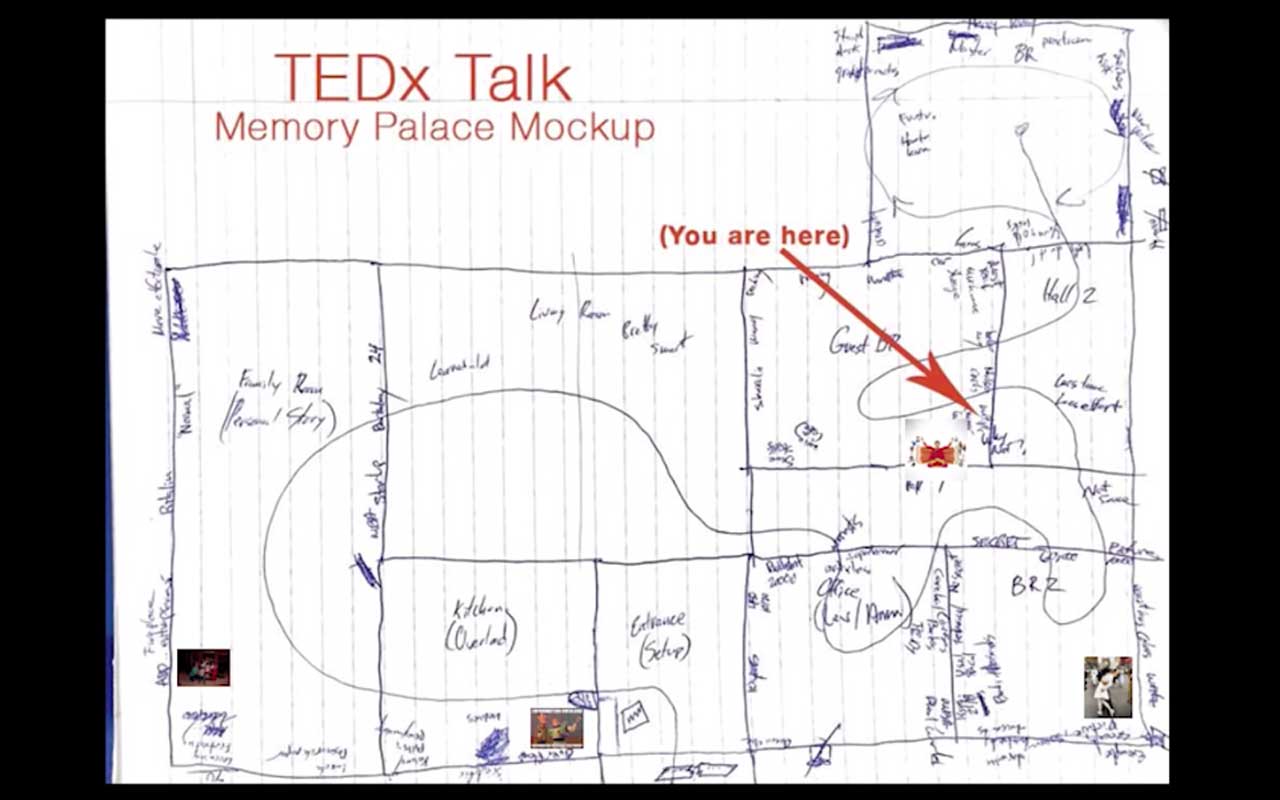Podcast: Download
Subscribe: Apple Podcasts | RSS
 Imagine this: you’re standing up in front of an audience and giving an important speech.
Imagine this: you’re standing up in front of an audience and giving an important speech.
Now tell me, how do you feel? Are your hands sweaty or your knees shaky? Is your stomach tied up in knots and feeling a bit queasy?
If you’re anything like me during my undergraduate years, maybe you even have a phobia of public speaking.
Yes, it’s true.
I might be a TEDx speaker now who gives presentations from memory around the world, but I once had a terrible aversion to giving speeches.
But now I use memory techniques and on this page I’ll share with you my best tips.
You’ll discover not only how I memorized my TEDx Talk word-for-word, but also an example from another successful speaker who I taught these techniques to over an hour. His talk did not get as many views as mine, but still did really well!
Since being able to give speeches is a highly marketable skill that also lets you express your personality, it only makes sense to learn how to do it right. Without sounding like a robot.
Ready?
Let’s dive in!
The Best Way To Memorize A Speech
The short answer is to use a Memory Palace. This simple memorization technique will help you feel fearless, focused, and give you the ability to track back if you ever do lose your place.
This is because this specific technique enables you to use space in the world to memorize exactly what you want to deliver… in the order you want to deliver it. As you move through your Memory Palace, you’re just ticking off boxes, spatially speaking.
You know when you’ve finished a specific section of your speech, and you know exactly where you are in space. This is why it’s easier to find your place if you momentarily get lost.
How To Memorize A Speech: Step-By-Step
As we go through these steps, keep in mind that they are quite linear.
This is the exact process I have followed many times over the years. They are the modern version of an approach that has been around since at least 90 BCE, as described in a book called Rhetorica ad Herennium.
Step One: Write A Great Speech
It sounds kind of obvious, but I want to point it out all the same.
So many speeches fail because they speaker knows that their message isn’t great.
There’s only one fix: Put in the time to boil your message down to just one idea. Craft it and shape it like a wordsmith.
Include examples and quotes, use metaphors and similes, all in the service of addressing just one key theme or thesis.
Also, make sure to choose an opening with short and simple words. One study in particular has found something I think that accounts for the success of my TEDx Talk and my video presentations overall: short and simple words are correlated with trustworthiness.
It’s worth reading your written speech over several times, and ideally having it reviewed by at least one other person.
To get an object take on it yourself, record yourself speaking the speech out loud that you’re sure it sounds right. Often, you’ll be able to weed out unnecessary words a lot better once you’ve heard what they sound like when played back on a recording.
You can also get a speaking mentor like I did. I’ve actually interviewed him on my podcast where we go over further details about how I delivered my TEDx Talk based on his presentation coaching.
You’ll save a lot of time by only memorizing a speech that you don’t need to change after you’ve memorized it.
Next, you’ll begin to create the ultimate tool for memorizing the perfected speech.
Step Two: Create a Memory Palace
A Memory Palace is simply a mental recreation of a location you’re familiar with. First, you draw out a journey and then decide where you will play mnemonic images that remind you of each and every word.
Let’s look at a specific example of how a real person uses this technique based on my help: Jonathan Levi and his TED Talk “What if Schools Taught us How to Learn?“
As I just mentioned, I suggest you draw out your Memory Palace journey. Here’s Jonathan’s:

The trick is to make the Memory Palace big enough to contain your entire talk.
For my own TEDx Talk, I used an entire neighborhood in Kelvin Grove, part of Brisbane:

Step Three: Use Compression & Keywords To Memorize the Speech
You don’t have to place every single word inside of your Memory Palace.
Certainly, you can, and there are verbatim quotes in my TEDx Talk where I did just that.
However, for most of the talk, I was using one or two images to remind me of entire sentences.
For example, “How would you like to completely silence your mind?” was just the image of Howie Mandel hitting the YouTube like button and creating silence.
If you’re new to memory techniques, it can be challenging to come up with associations for your quotes and keywords. I suggest you learn the pegword method. It will make it simple for you to rapidly assign your associations.
Step Four: Rehearse Using the “Big Five”
Once you’ve memorized your speech using the Memory Palace, it’s time to use the Big Five at least five times.
What does that mean?
- Write out what you’ve memorized, from memory.
- Speak it out loud, either to yourself or someone else.
- Record yourself speaking and then listen to the recording.
- Get your recording transcribed and read it over.
- And practice, practice, practice!
Practice your speech in front of the camera or in front of friends. Use the relaxation tips I shared earlier in the post. And get as comfortable as you possibly can before you jump up on that stage.
Finally, let’s take a look at a couple of real-life examples, so you can see how this methodology works in practice.
Real-Life Examples of How to Remember a Speech Using Alternative Approaches
In this section, we’ll talk about how to memorize a speech quickly using some of my favorite alternatives to the Memory Palace technique.
There are a couple of speeches I give regularly. Both the NAME and FREE speech are very fluid and packaged, and I do them entirely from memory based on acronyms.
Let’s look at both speeches, starting with…
The NAME Speech
When I give this speech, I talk about how to memorize names.
I follow the acronym “NAME.”
- Noticing,
- Making Associations,
- Using Memory Palaces, and
- Managing Expectations.
Within 20 minutes I’m done and everyone in that room can memorize any name they want!
Does working from an acronyme mean my speech is a little bit different every time? Of course, but this method is super simple to follow, very structured, and gives me the chance to just talk about the topic.
Next, let’s look at…
The FREE Speech
The same thing goes for this particular speech. When I give this speech, I run through the acronym:
- Frequency,
- Relevance,
- Edutainment, and
- Engagement.
What I find fun about using acronyms to memorize your speech is that you can also use them backward. Sometimes I’ll write out “FREE” on the board, and then proceed to work up from the bottom. It’s a great way to catch the audience’s attention.
Hopefully, by this point, your interest has been piqued. And maybe you even want to learn more about how to give a great speech.
The Ultimate Benefits of Memorizing A Speech
Now that you know how to memorize a speech, I think it’s worth looking at some of the benefits I’ve enjoyed over the years.
Marketability
There are lots of companies that need someone to be able to present the value they offer – their expertise, unique selling proposition, value for the market, etc – and why customers should pick them. It’s the same for you — you want to be known as the person a company wants to hire, the one they want to promote, the one they want to give a raise.
Public speaking displays your expertise
Your ability to speak coherently and clearly is a key indicator to both your employer and clients that you know your stuff. When you can speak from the top of your mind without hemming and hawing or stuttering, it lets your knowledge shine.
Stepping on stage develops courage
Getting comfortable with public speaking takes practice — and getting out there and starting to give speeches (even if it’s just to a friend or two at first) will begin to build your courage muscle. It’s a win-win.
Speaking shows your personality
As you practice giving speeches, you’ll begin to develop your own personal presentation style. And the more comfortable you get, the more your personality will shine.
Giving speeches helps build relationships
Getting out into the community allows you to connect with people in both your personal and business networks. And if you’re still in school, it can help you build connections with your teachers and your fellow students.
Public speaking sets you up as an expert in your field
When you’re the one up on stage, it’s clear to the audience that you know what you’re talking about. You can prepare the road ahead by being known as the expert who has the courage to get up on stage and share their knowledge. Just look at Sunil Khatri’s speech success story.
It helps you deliver results to other people.
Right now, your audience doesn’t have a particular set of knowledge. When you get up on stage, you’re able to give them that knowledge — and package it in a way that helps them quickly absorb it. Plus, you can do so in a way that encourages them to take action, because they’ve seen you demonstrate how valuable it is from the stage.
Speaking can help you build your memory as you learn
Learning to memorize a speech will help you build your memory as you go. Even if you do need notes in the beginning, you can still improve your memory as you practice your speech.
So as you can see, learning to commit your talks to memory is not only a valuable skill, but being able to jump up on stage and speak off the top of your mind is actually a lot of fun!
Have Fun Memorizing a Speech
Think back to how giving speeches used to make you feel.
Sweaty. Queasy. Shaking just thinking about stepping up on stage.
Now, think about how confident and powerful you can feel standing up on stage as you deliver your expertise to a rapt audience.
This second scenario isn’t just possible… it’s probable. All you have to do is follow the tips and techniques in this post, and before you know it you’ll be a cool and confident public speaker.
But maybe you’re thinking, “I don’t know how to get started — how can I give my first speech?” I would recommend to everybody, if you haven’t given a speech in your life, make an occasion to go out and give a speech, and give it in different ways.
Give a number of speeches, even if it’s just to a small audience or a close group of friends. This simple practice will help develop both your crystal and fluid intelligence – both needed for developing the skill of speaking. And try different formats: recite from a piece of paper, do partial recall from memory, speak verbatim from memory, or any way you prefer.
And whatever you do, have fun with it! Giving speeches is a great way to play a giant, satisfying brain game — as well as delivering value to others and setting yourself up as an expert in your field.
If you’re still feeling uncertain, there’s a mini-course in the Magnetic Memory Method Masterclass about memorizing speeches that goes deeper into this topic.
Dive in, enjoy and please let me see you deliver your speech once it’s recorded and up online!
Related Posts
- Can You Memorize Books Page By Page Without Using Memory Techniques?
The answer? Probably not.
- How to Memorize Something Fast: 5 Simple And PROVEN Memory Techniques
Wondering how to memorize things fast? Read this post for 5 solid steps you can…
- How to Memorize Lines Fast
Knowing how to memorize lines fast is easy to learn and fun to practice. Never…







4 Responses
Great podcast Anthony. I continue to learn from you and improve my own memory. I am excited to be preparing a mini class to teach my 17 year old nephew the basics of the memory palace and the major system. He is enrolled in a pre-law program and I believe this type of training will serve him well for his entire career. I just hope I can make it interesting enough for him to continue to pursue his own memory training and perhaps take your course eventually. Keep up the great work. You are an inspiration!
Great that you’re doing this for your son, Steven. These techniques are very useful in legal studies.
We find time and again that they way to make these memory skills interesting to young people is to make it a family activity. If you can demonstrate that you have the skills, often your kids will naturally want to master them too.
This is an excellent podcast for those who also get nervous talking to a webcam (me, me, me). Thank you for creating this golden podcast.
Thanks for checking this out, James, and glad it is giving your some help for speaking on video.
I was really nervous in the beginning too. The sooner we get into the practice, the sooner we can gain that confidence and serve our audience.
What topic do you want to make videos about?